 Liane Zane brings her Elioud Legacy trilogy to a rousing and powerful conclusion in this novel, which was actually my favorite of the three. (Full disclosure at the outset: Liane, who’s a Goodreads friend of mine, generously gifted me with a paperback ARC, because she knew I’d really liked the two earlier books. No promise of a good review was offered or requested; this book amply earned that on its merits.)
Liane Zane brings her Elioud Legacy trilogy to a rousing and powerful conclusion in this novel, which was actually my favorite of the three. (Full disclosure at the outset: Liane, who’s a Goodreads friend of mine, generously gifted me with a paperback ARC, because she knew I’d really liked the two earlier books. No promise of a good review was offered or requested; this book amply earned that on its merits.)
This is definitely a series that needs to be read in order. Our story here opens in medias res, and readers who begin here won’t have much knowledge of the premise or the situation –nor, especially, of the characters and their relationships. You really need the context of the first two books to fully appreciate this one. (With that context, though, it becomes a wonderful capstone to the arch the author has crafted!) However, for the benefit of readers who haven’t read either of those books nor my or others’ reviews of them, and who may not have seen the book description either, the titular “Elioud” are human-angel hybrids (matings between the two races having begun before the Flood, and some unions –or rapes of humans by fallen angels– supposedly continuing to occur). Depending on their degree of angelic inheritance, Elioud may have special abilities that most humans do not, and may be quite long-lived (as in, centuries) as well. Those who are aware of what they are may choose, like other humans, to knowingly serve God or Satan (or, also like many humans, to imagine that they can just ignore that whole conflict and be neutrals). But for those on one side or the other, the term “spiritual warfare” may be a lot more literal than it is for most believers.
Near the beginning of the series opener, the three heroines of the trilogy, a close-knit trio of cross-national friends in their early 20s, all of them both working for their respective countries’ intelligence services and involved on the side in a sub rosa vigilante operation of their own against sex traffickers and predators, met three long-lived Elioud warriors, who revealed to the ladies that they also have angel ancestry. Together, the six of them were involved in fighting the nefarious plots, continued across the first two books, of the fallen angel Asmodeus, who’s now set himself up as a cult leader for a sect of brain-washed humans who call themselves bogomili, after a medieval heretical sect (but who are a lot more malevolent and murderous than their earlier, peaceful namesakes). The other aspect of the series plot is that each member of these two trios felt a strong attraction to a member of the other one. It wasn’t hard to predict that each of the three novels would focus on one of these pairs, and that the course of their romance would be an important plot strand. So here, Beta Cerna and Andras Nagy take center stage.
 For me, in the previous books, these two characters had always seemed the least interesting and appealing, largely because I didn’t really know them. Indeed, Beta (short for Alzbeta –she’s Czech) is hard to get to know. She’s a “lone wolf” with very few friends, and a brusque manner that can come across as practically feral. And because Andras is big, strong and taciturn, and mostly inclined to obey orders, it’s easy to fall into the trap of subconsciously dismissing him as not very smart or sensitive (though that’s a great mistake!). But here they come into their own; we see them as the complex and special people they truly are. The previous book ended with Beta arousing a sleeping, half groggy Andras for an unexpected sexual encounter in his bed –and then vanishing before morning. When this book opens, none of the other five main characters have seen her for three years (so it’s now 2018). But we soon learn that there’s been more of a reason for her disappearance than her commitment issues. Much is going on, and Asmodeus (and his fellow demon Yeqon. whom we met in the second book) are exponentially ratcheting up their plans, which won’t bode well for humanity if they come to fruition. But the Archangel Michael (directed, of course, by God, though here He operates offstage) has plans too….
For me, in the previous books, these two characters had always seemed the least interesting and appealing, largely because I didn’t really know them. Indeed, Beta (short for Alzbeta –she’s Czech) is hard to get to know. She’s a “lone wolf” with very few friends, and a brusque manner that can come across as practically feral. And because Andras is big, strong and taciturn, and mostly inclined to obey orders, it’s easy to fall into the trap of subconsciously dismissing him as not very smart or sensitive (though that’s a great mistake!). But here they come into their own; we see them as the complex and special people they truly are. The previous book ended with Beta arousing a sleeping, half groggy Andras for an unexpected sexual encounter in his bed –and then vanishing before morning. When this book opens, none of the other five main characters have seen her for three years (so it’s now 2018). But we soon learn that there’s been more of a reason for her disappearance than her commitment issues. Much is going on, and Asmodeus (and his fellow demon Yeqon. whom we met in the second book) are exponentially ratcheting up their plans, which won’t bode well for humanity if they come to fruition. But the Archangel Michael (directed, of course, by God, though here He operates offstage) has plans too….
Many of the strengths of the preceding books are evident here also. Zane realizes the settings well (events take place in several European countries), and flavors the narrative with glimpses of the various customs, languages, folklore and cuisine of the nationalities represented. Her characters are round, vivid, dynamic, and distinct (every one of the six main characters have their own unique personalities, rather than being clones of the others, but the supporting characters are also clearly drawn). There’s a strong good vs. evil conflict (with a recognition that we wage this conflict in our own hearts, not just with other people), with high stakes and a lot of dramatic tension. Though this isn’t commercial “Christian fiction,” it’s fiction written by a Christian (the author is a practicing Roman Catholic) and the basic message is Christian. (As in much supernatural fiction, the angels vs. demons conflict is a metaphor for the spiritual conflicts of the real world.) My one quibble here is that our heroes and heroines don’t pray much in crisis situations (and they’re up to their eyeballs in the latter, which would do wonders for my prayer life!). But that’s a fairly minor point. It was also actually easier for me to achieve “suspension of disbelief” here than in the first two books, despite the continuing murky points of angelology/demonology, and the ramping up of Elioud powers here (the mating of two Elioud warriors enhances their abilities). Perhaps that’s because by now I’ve gotten more used to my Elioud friends and their fictional world. :-)
Bad language here is minimal. There are some references to lewd and disgusting sexual behavior (Asmodeus and Yeqon hang out in Amsterdam’s red-light district, and their sexual attitudes are what you’d expect from demons), and one instance of premarital, though not casual, sex; but Zane doesn’t emphasize the former any more than she has to, and the latter is explicit only up to a point. (Basically, the romantic content is quite wholesome, and a wedding –I’m not saying whose!– is one of the more moving scenes in the book.) This is definitely the most violent book of the series, though, with two major pitched battles and a body count through the roof, not all of the casualties being bad guys. However, fans of action thrillers won’t mind this, and fans who like their heroines tough will love Beta. (She’s a deadly accurate shot with both a pistol and a long gun, but her favorite weapons are her chain whip and her karambit, a hooked originally Indonesian knife modified as a switchblade, which she finds it soothing to flick open and closed when she’s nervous, the way some people tap their foot. :-) )
While this is, like the others in the trilogy, a thick, substantial novel, at 525 pages it doesn’t feel a bit overly long; I was immersed and interested immediately, and stayed so for every page. It’s also a highly evocative read emotionally, with some beautiful writing and imagery in places (and some very grim images as well). I’d enthusiastically recommend it to fans of supernatural fiction with Christian themes, of action thrillers or action heroines (or heroes), and of paranormal romance.
Author: Liane Zane
Publisher: Zephon Books; available through Amazon, both for Kindle and as a printed book.
A version of this review previously appeared on Goodreads.
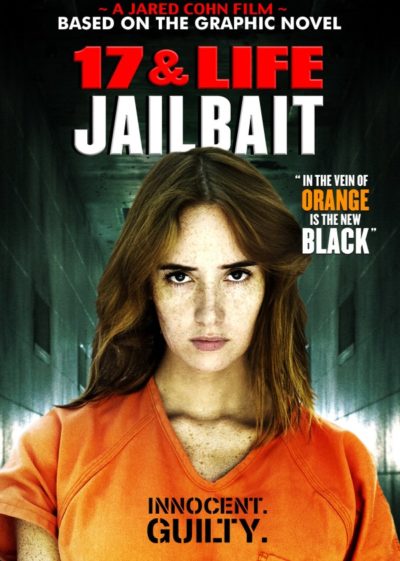 Of all the scathing reviews this has accumulated on Letterboxd.com, I think my favorite is the one which starts, “Obviously written by someone who knows absolutely nothing about the penal system.” Yes, seriously. I strongly suspect things like this were written by people who know absolutely nothing about women-in-prison films, and who inexplicably managed to overlook the title of the damn movie in their expectations. Me, I had initially overlooked this, believing it to be just a retitling of the same director’s Locked Up, a glorious slab of WiP insanity. When I discovered it was actually a different movie entirely. it went quickly to the top of my pending pile.
Of all the scathing reviews this has accumulated on Letterboxd.com, I think my favorite is the one which starts, “Obviously written by someone who knows absolutely nothing about the penal system.” Yes, seriously. I strongly suspect things like this were written by people who know absolutely nothing about women-in-prison films, and who inexplicably managed to overlook the title of the damn movie in their expectations. Me, I had initially overlooked this, believing it to be just a retitling of the same director’s Locked Up, a glorious slab of WiP insanity. When I discovered it was actually a different movie entirely. it went quickly to the top of my pending pile.




 Not to be confused with the 2022 rape-revenge film of the same name (which I’ll get round to reviewing down the pipe), this is somewhat lighter in tone, though there’s a case to be made that this clashes terribly with the subject matter. Jenny (Hsu) is a journalist, working under Cheryl (Garofalo),and her work has brought her to the attention of an online stalker, who sends her increasingly disturbed and disturbing emails. When the harassment begins to move from the cyberworld into the real one, and the authorities fail even to reach the level of disinterest, Jenny teams up with room-mate Lisa (Morales), to hunt down the perpetrator and bring him to justice themselves.
Not to be confused with the 2022 rape-revenge film of the same name (which I’ll get round to reviewing down the pipe), this is somewhat lighter in tone, though there’s a case to be made that this clashes terribly with the subject matter. Jenny (Hsu) is a journalist, working under Cheryl (Garofalo),and her work has brought her to the attention of an online stalker, who sends her increasingly disturbed and disturbing emails. When the harassment begins to move from the cyberworld into the real one, and the authorities fail even to reach the level of disinterest, Jenny teams up with room-mate Lisa (Morales), to hunt down the perpetrator and bring him to justice themselves.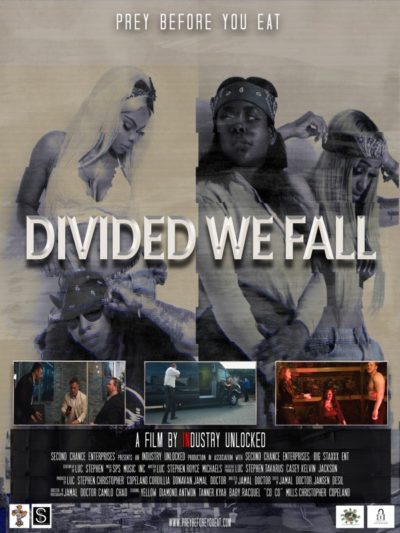 We begin with the usual disclaimer for films of this kind: middle-aged white guys like me are not the target audience. However, I think it’s fair to say that concepts like story-telling and character development are not limited to any particular race, colour or creed, so I still feel equipped to offer an opinion on these aspects. Though, actually, what felt like it worked best here was its strong sense of place. I’ve never been to the projects in Jamaica, New York (though Chris grew up elsewhere in the same borough of Queens). But the film does a good job of showing you that environment; it certainly works better than the (largely token) efforts to convince you some scenes take place in Miami, or even Moscow.
We begin with the usual disclaimer for films of this kind: middle-aged white guys like me are not the target audience. However, I think it’s fair to say that concepts like story-telling and character development are not limited to any particular race, colour or creed, so I still feel equipped to offer an opinion on these aspects. Though, actually, what felt like it worked best here was its strong sense of place. I’ve never been to the projects in Jamaica, New York (though Chris grew up elsewhere in the same borough of Queens). But the film does a good job of showing you that environment; it certainly works better than the (largely token) efforts to convince you some scenes take place in Miami, or even Moscow. This is a sequel to Traucki’s 2010 film, The Reef, whose synopsis reads: “A sailing trip becomes a disaster for a group of friends when the boat sinks and a white shark hunts the helpless passengers.” I haven’t seen it, yet based on that, I’m not sure I need to. Replace “sailing” with “kayaking”, and you’re more or less here. Perhaps lob in a bit borrowed from
This is a sequel to Traucki’s 2010 film, The Reef, whose synopsis reads: “A sailing trip becomes a disaster for a group of friends when the boat sinks and a white shark hunts the helpless passengers.” I haven’t seen it, yet based on that, I’m not sure I need to. Replace “sailing” with “kayaking”, and you’re more or less here. Perhaps lob in a bit borrowed from  Liane Zane brings her Elioud Legacy trilogy to a rousing and powerful conclusion in this novel, which was actually my favorite of the three. (Full disclosure at the outset: Liane, who’s a Goodreads friend of mine, generously gifted me with a paperback ARC, because she knew I’d really liked the two earlier books. No promise of a good review was offered or requested; this book amply earned that on its merits.)
Liane Zane brings her Elioud Legacy trilogy to a rousing and powerful conclusion in this novel, which was actually my favorite of the three. (Full disclosure at the outset: Liane, who’s a Goodreads friend of mine, generously gifted me with a paperback ARC, because she knew I’d really liked the two earlier books. No promise of a good review was offered or requested; this book amply earned that on its merits.) For me, in the previous books, these two characters had always seemed the least interesting and appealing, largely because I didn’t really know them. Indeed, Beta (short for Alzbeta –she’s Czech) is hard to get to know. She’s a “lone wolf” with very few friends, and a brusque manner that can come across as practically feral. And because Andras is big, strong and taciturn, and mostly inclined to obey orders, it’s easy to fall into the trap of subconsciously dismissing him as not very smart or sensitive (though that’s a great mistake!). But here they come into their own; we see them as the complex and special people they truly are. The previous book ended with Beta arousing a sleeping, half groggy Andras for an unexpected sexual encounter in his bed –and then vanishing before morning. When this book opens, none of the other five main characters have seen her for three years (so it’s now 2018). But we soon learn that there’s been more of a reason for her disappearance than her commitment issues. Much is going on, and Asmodeus (and his fellow demon Yeqon. whom we met in the second book) are exponentially ratcheting up their plans, which won’t bode well for humanity if they come to fruition. But the Archangel Michael (directed, of course, by God, though here He operates offstage) has plans too….
For me, in the previous books, these two characters had always seemed the least interesting and appealing, largely because I didn’t really know them. Indeed, Beta (short for Alzbeta –she’s Czech) is hard to get to know. She’s a “lone wolf” with very few friends, and a brusque manner that can come across as practically feral. And because Andras is big, strong and taciturn, and mostly inclined to obey orders, it’s easy to fall into the trap of subconsciously dismissing him as not very smart or sensitive (though that’s a great mistake!). But here they come into their own; we see them as the complex and special people they truly are. The previous book ended with Beta arousing a sleeping, half groggy Andras for an unexpected sexual encounter in his bed –and then vanishing before morning. When this book opens, none of the other five main characters have seen her for three years (so it’s now 2018). But we soon learn that there’s been more of a reason for her disappearance than her commitment issues. Much is going on, and Asmodeus (and his fellow demon Yeqon. whom we met in the second book) are exponentially ratcheting up their plans, which won’t bode well for humanity if they come to fruition. But the Archangel Michael (directed, of course, by God, though here He operates offstage) has plans too…. This bio-pic of aviator Amy Johnson appeared in British cinemas a scant eighteen months after she disappeared over the River Thames. That put its release squarely in the middle of World War II, and explains its nature which, in the later stages, could certainly be called propaganda. There’s not many other ways to explain pointed lines like “Our great sailors won the freedom of the seas. And it’s up to us to win the freedom of the skies. This is first said during a speech given by Johnson in Australia, then repeated at the end, over a rousing montage of military marching and flying. I almost expected it to end with, “Do you want to know more?”
This bio-pic of aviator Amy Johnson appeared in British cinemas a scant eighteen months after she disappeared over the River Thames. That put its release squarely in the middle of World War II, and explains its nature which, in the later stages, could certainly be called propaganda. There’s not many other ways to explain pointed lines like “Our great sailors won the freedom of the seas. And it’s up to us to win the freedom of the skies. This is first said during a speech given by Johnson in Australia, then repeated at the end, over a rousing montage of military marching and flying. I almost expected it to end with, “Do you want to know more?”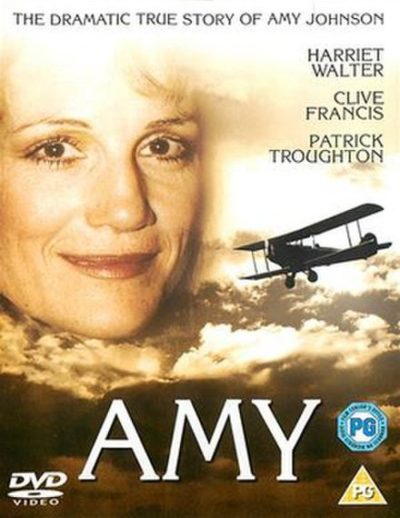 It’s interesting to compare the approach taken in this biopic of aviation heroine Amy Johnson, made in 1984, with the one over 40 years earlier (and shortly after her death) in
It’s interesting to compare the approach taken in this biopic of aviation heroine Amy Johnson, made in 1984, with the one over 40 years earlier (and shortly after her death) in 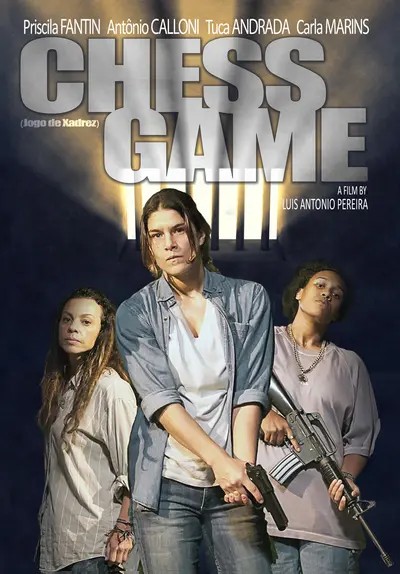 I had to work quite hard to see this: while it is on Tubi, the subtitles there were only in Spanish, and so not much help (I’m still at the “Donde esta la biblioteca?” level). Fortunately, it then turned up on Vudu, and I bravely made my way through their crappy interface and frequent adverts to bring you this review. It was worth it. This is a solid slice of women-in-prison action/drama from Brazil, though perhaps less exploitative than I expected (especially given the country’s history in the sub-genre!) . I mean, Marins is a former model in Brazillian Playboy, so you’ll understand I had… certain expectations. Fortunately, the rest of the movie proved more than adequate to hold my attention.
I had to work quite hard to see this: while it is on Tubi, the subtitles there were only in Spanish, and so not much help (I’m still at the “Donde esta la biblioteca?” level). Fortunately, it then turned up on Vudu, and I bravely made my way through their crappy interface and frequent adverts to bring you this review. It was worth it. This is a solid slice of women-in-prison action/drama from Brazil, though perhaps less exploitative than I expected (especially given the country’s history in the sub-genre!) . I mean, Marins is a former model in Brazillian Playboy, so you’ll understand I had… certain expectations. Fortunately, the rest of the movie proved more than adequate to hold my attention. 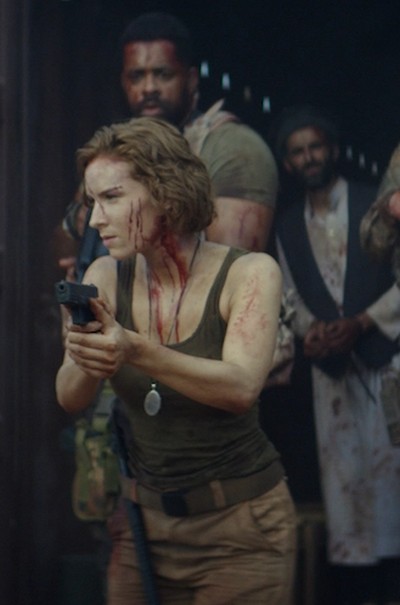 There is a tendency for directors married to actresses to make them action heroines. This perhaps started with Renny Harlin and Geena Davis, but the most famous example is probably Paul W.S. Anderson and Milla Jovovich (she was previously married to Luc Besson too). It seems that Marshall and Kirk may be heading that way, with her starring in his last two movies. First there was witch-pic The Reckoning, and now this, which blends elements from a number of genre films. Not the least of which are Marshall’s own Dog Soldiers and
There is a tendency for directors married to actresses to make them action heroines. This perhaps started with Renny Harlin and Geena Davis, but the most famous example is probably Paul W.S. Anderson and Milla Jovovich (she was previously married to Luc Besson too). It seems that Marshall and Kirk may be heading that way, with her starring in his last two movies. First there was witch-pic The Reckoning, and now this, which blends elements from a number of genre films. Not the least of which are Marshall’s own Dog Soldiers and  Roughly ten minutes into this, it was clear I’d made a terrible mistake. I’ve seen my share of wretched creature features in my time, and this is down near the bottom of the barrel. It does have an interesting, if totally ludicrous idea. Five women are invited to a remote hotel, to take part in a game-show, competing for a prize of £100,000. Among them is struggling single mother Sienna (Wunna) who, unable to find a baby-sitter, takes her two kids with her. As the cover ever so subtly suggests, the game has carnivorous dinosaurs roaming the hotel and grounds, and “winning” simply means not getting eaten. Naturally, Sienna’s two kids also disobey Mum’s instructions not to leave the room.
Roughly ten minutes into this, it was clear I’d made a terrible mistake. I’ve seen my share of wretched creature features in my time, and this is down near the bottom of the barrel. It does have an interesting, if totally ludicrous idea. Five women are invited to a remote hotel, to take part in a game-show, competing for a prize of £100,000. Among them is struggling single mother Sienna (Wunna) who, unable to find a baby-sitter, takes her two kids with her. As the cover ever so subtly suggests, the game has carnivorous dinosaurs roaming the hotel and grounds, and “winning” simply means not getting eaten. Naturally, Sienna’s two kids also disobey Mum’s instructions not to leave the room.